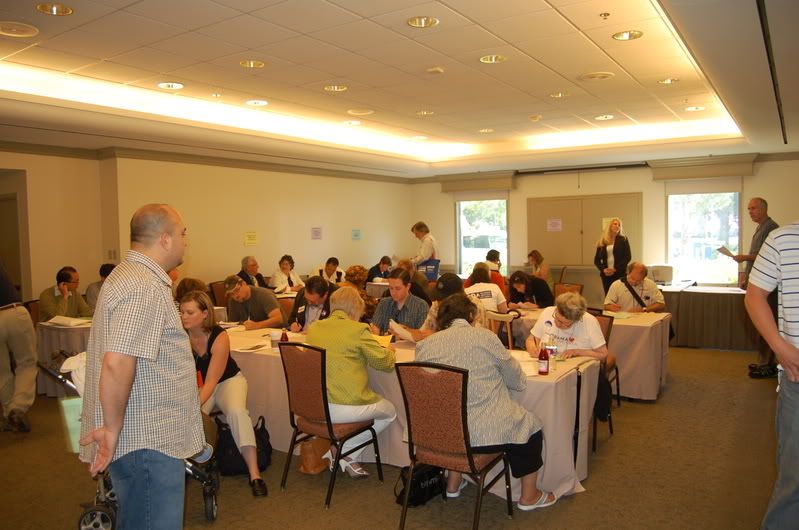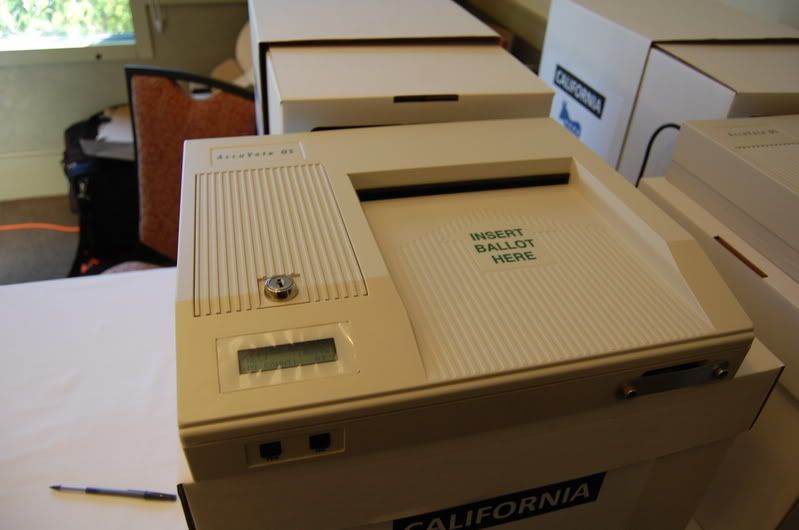Originally posted to the Progressive Caucus list serve of the California Democratic Party by Garry Shay.
I want to open up a debate here.
For the first time since they were conceived, the votes of so-called “super-delegates” may actually matter with regard to the nomination of the Democratic Party candidates for President and Vice-President of the United States.
As a matter of explanation and illumination, super-delegates are either members of Congress or of the DNC. They are un-pledged delegates to the National Convention in Denver. They are either elected by their districts, states, state parties, or other constituencies such as the Democratic State Treasurer’s Association, or the Democratic Municipal Officials Association, or similar organizations. 75 DNC members were appointed by Governor Dean in 2004.
The question I pose is not who super-delegates should vote for, but rather how they should come to their decision.
Edit by Brian: Continued over the flip
The question is not whether or not they should exist, because the fact is, they do. As my torts professor once said, in his thick German accent, if my grandmother had wheels, she’d be a Volkswagen, but she doesn’t. What ever you think of the system itself, it is the reality we work in at this time.
And the question is not whether or not the Super-Delegates should come to a decision, because sitting it out is essentially a vote against any candidate, since we are part of the majority needed to nominate. Not voting does not lower the number needed to nominate and also deprives our constituency (whatever that may be) of their representation under the current rules. I don’t think any of us would really advocate for that.
I know the people on this list are quite capable of carrying on a philosophic discussion and not allow it to devolve into a debate of personality, if they choose to do so.
I ask you to participate in this discussion at that level. Please do not refer to Clinton or Obama. Please keep the discussion a step above personality and specific candidates.
This discussion is about the nature of representative democracy. Is one elected to represent their constituency, or to vote their conscience, or some other formula? How does that apply to the present situation?
As pertains to myself, and 18 other elected DNC members, we were elected by the Executive Board of the California Democratic Party four (4) years ago. Our terms run from the day after one convention, to the day after the next. We are among the first elected delegates to a National Convention. Only Senators elected in 2002 were elected earlier. The CDP Executive Board will be electing some of the first delegates to the 2012 National Convention this June. That election has no effect on the current convention decision.
What are we elected to do? Who were we elected to represent?
Other formulations may apply to other super-delegates, but here are the various formulations I have come up with, at least as pertains to the 19 CDP DNC members elected in 2004:
1. I was elected because my electorate trusted my judgement and I should vote my conscience.
2. I was elected to represent those who elected me 4 years ago, who are not the same people who are on the CDP Executive Board at the present time. I should poll the former Executive Board of the CDP, after the last primary and before the convention.
3. I was elected to represent the CDP Executive Board, as an institutional body. I should poll the current Executive Board of the CDP, after the last primary and before the convention.
4. I was elected by the CDP Executive Board to represent the same people they represent, the Democrats of the State of California, and thus should vote however the majority of Democrats voted on February 5, 2008.
5. I should vote for the candidate most likely to win in November, in my opinion.
6. I should vote for the candidate who best exemplifies the Platform of the CDP.
7. I should vote for the candidate who best exemplifies the Platform of the National Convention.
8. I should vote for the candidate with the most pledged delegates, unless for some bizarre reason, I can honestly say that such a candidate is an anathema to the Democratic Party principles as I understand them.
9. I was elected to synthesize all of the above into a decision, which you recognize is an impossible task, but trusted I would do the right thing for the right reason.
10. Vote the way you personally want me to and if I don’t you will hold me personally responsible. (This is not really a choice, but I recognize it is perhaps a reality for some).
I would like your thoughts on this. Seriously. I will pass them on to all members of the CDP DNC delegation, and those of the Western States, as well.
Garry S. Shay
Member, Democratic National Committee (CA) and
Lead Chair Rules Committee, California Democratic Party
Titles for identification purposes only
==========================================




